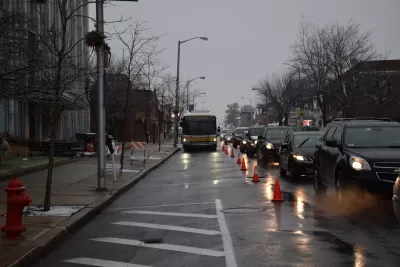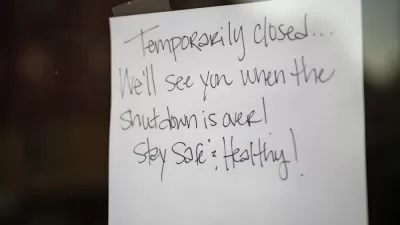A long awaited report on the future of transportation in the Bay State was released last Friday. Among the recommendations: a phaseout on the sales of gas and diesel powered light duty vehicles and allowing cities to enact cordon congestion pricing.

On Dec. 14, the Commission on the Future of Transportation in the Commonwealth released its two-part report on transportation needs and challenges facing the Commonwealth between 2020 and 2040. The commission was established by executive order in January to provide recommendations to the Baker-Polito Administration on how to best account for potential changes in transportation in the future.
"At the heart of the mammoth report’s many recommendations, said Transportation Secretary Stephanie Pollack, is fixing public transit and putting it on sound financial footing, with the explicit goal of reducing the number of cars on the road," reports Adam Vaccaro who covers transportation, infrastructure, and commuter issues for the Globe.
“Whether today or in the future, we simply must move more people in fewer vehicles if we are serious about reducing congestion and greenhouse gas pollution,” Pollack said.
Vaccaro reports on some of commission's many findings, which should, in theory, represent to some extent the administration's beliefs if only in the sense that Baker and Lt. Gov. Karyn Polito selected the commissioners.
Massachusetts should develop tools to phase out the use of gas-powered cars and light trucks after 2040, the commission said, by offering rebates and other incentives to steer people to electric vehicles. While internationally, France, the United Kingdom, and others are moving toward such policies, in the United States only California has come close to even broaching such an aggressive idea.
Cordon area congestion pricing was also a recommendation, but the governor's track record on congestion pricing, let alone cordon area tolling, is not exactly inspiring. On Aug. 3, Gov. Baker vetoed a rather simple legislative proposal to conduct a pilot program to reduce off-peak tolls, most likely on the three state tolled facilities. Baker preferred a study of traffic congestion.
In addition, Baker vetoed a vehicle miles traveled fee pilot program in August 2016.
Reception by groups
The report was received with some skepticism Livable Streets, a people-centered transportation advocacy group.
“I’m a little jaded because I’ve seen so many commissions and plans. So what’s next, Governor Baker?” said executive director Stacy Thompson. “Any transportation advocate can look at this document and find something they like and something they’d like to improve. But now, you’ve got this commission report, so what are you going to do about it?”
The Conservation Law Foundation and the Sierra Club were more optimistic.
“We need a strong mandate to decarbonize our transportation sector,” said Amy Laura Cahn, a senior attorney with the Conservation Law Foundation. “The goal for all cars to be zero-emission by 2040 helps set us on that pathway.”
"Given that transportation is our state’s largest source of greenhouse gas emissions, the release of this report demonstrates the first steps of Governor Baker taking that pledge [to focus on climate change] seriously," stated Deb Pasternak, Interim Chapter Director for the Massachusetts Sierra Club. "We encourage the Baker Administration to act quickly to implement solutions laid out in this report..."
Successful political campaigns in both the state Democratic primary and general elections this year conducted by the Sierra Club and 350 Mass Action were cited recently by InsideClimate News on the possibility that Massachusetts could be one of seven states to enact carbon pricing next year. The groups took action "after House lawmakers backpedaled on a revenue-neutral carbon tax that the Senate had unanimously passed," reported Marianne Lavelle.
Related:
- Could Boston Join Seattle in Proposing Congestion Pricing? April 19, 2018: The compelling reason behind Boston's looking at congestion pricing is traffic congestion, unlike Seattle where it is being viewed as a major way to reduce greenhouse gas reductions and fund public transit.
Hat tip to IBTTA SmartBrief.
FULL STORY: Mass. releases its vision for beating the traffic

Planetizen Federal Action Tracker
A weekly monitor of how Trump’s orders and actions are impacting planners and planning in America.

Restaurant Patios Were a Pandemic Win — Why Were They so Hard to Keep?
Social distancing requirements and changes in travel patterns prompted cities to pilot new uses for street and sidewalk space. Then it got complicated.

Map: Where Senate Republicans Want to Sell Your Public Lands
For public land advocates, the Senate Republicans’ proposal to sell millions of acres of public land in the West is “the biggest fight of their careers.”

Maui's Vacation Rental Debate Turns Ugly
Verbal attacks, misinformation campaigns and fistfights plague a high-stakes debate to convert thousands of vacation rentals into long-term housing.

San Francisco Suspends Traffic Calming Amidst Record Deaths
Citing “a challenging fiscal landscape,” the city will cease the program on the heels of 42 traffic deaths, including 24 pedestrians.

California Homeless Arrests, Citations Spike After Ruling
An investigation reveals that anti-homeless actions increased up to 500% after Grants Pass v. Johnson — even in cities claiming no policy change.
Urban Design for Planners 1: Software Tools
This six-course series explores essential urban design concepts using open source software and equips planners with the tools they need to participate fully in the urban design process.
Planning for Universal Design
Learn the tools for implementing Universal Design in planning regulations.
Heyer Gruel & Associates PA
JM Goldson LLC
Custer County Colorado
City of Camden Redevelopment Agency
City of Astoria
Transportation Research & Education Center (TREC) at Portland State University
Camden Redevelopment Agency
City of Claremont
Municipality of Princeton (NJ)





























